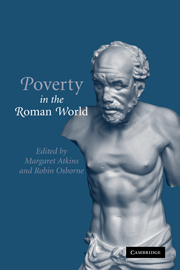Book contents
- Frontmatter
- Contents
- List of contributors
- Preface
- List of abbreviations
- Chapter 1 Introduction: Roman poverty in context
- Chapter 2 The poor in the city of Rome
- Chapter 3 Stratification, deprivation and quality of life
- Chapter 4 ‘You do him no service’: an exploration of pagan almsgiving
- Chapter 5 Writing poverty in Rome
- Chapter 6 Poverty and population in Roman Egypt
- Chapter 7 A pragmatic approach to poverty and riches: Ambrosiaster's quaestio 124
- Chapter 8 Portraying the poor: descriptions of poverty in Christian texts from the late Roman empire
- Chapter 9 Throwing parties for the poor: poverty and splendour in the late antique church
- Chapter 10 Salvian, the ideal Christian community and the fate of the poor in fifth-century Gaul
- Chapter 11 Poverty and Roman law
- Bibliography
- Index
Chapter 7 - A pragmatic approach to poverty and riches: Ambrosiaster's quaestio 124
Published online by Cambridge University Press: 22 September 2009
- Frontmatter
- Contents
- List of contributors
- Preface
- List of abbreviations
- Chapter 1 Introduction: Roman poverty in context
- Chapter 2 The poor in the city of Rome
- Chapter 3 Stratification, deprivation and quality of life
- Chapter 4 ‘You do him no service’: an exploration of pagan almsgiving
- Chapter 5 Writing poverty in Rome
- Chapter 6 Poverty and population in Roman Egypt
- Chapter 7 A pragmatic approach to poverty and riches: Ambrosiaster's quaestio 124
- Chapter 8 Portraying the poor: descriptions of poverty in Christian texts from the late Roman empire
- Chapter 9 Throwing parties for the poor: poverty and splendour in the late antique church
- Chapter 10 Salvian, the ideal Christian community and the fate of the poor in fifth-century Gaul
- Chapter 11 Poverty and Roman law
- Bibliography
- Index
Summary
INTRODUCTION
Ambrosiaster, the author of a set of quaestiones and of commentaries on the Pauline epistles, appears to have been writing in Rome in the last third of the fourth century ad. There is a long-running scholarly quest to establish a personal identity for Ambrosiaster, but it seems unlikely that this will ever be determined conclusively. Nonetheless, it is possible to locate Ambrosiaster more generally in an ecclesiastical context, for many of his quaestiones exhibit stylistic tics which suggest that they were delivered orally in church as sermons or catechetical lectures. Normally this would indicate that Ambrosiaster was a bishop, since only bishops preached. However, there is firm evidence that in Rome special dispensation was made for presbyters to preach, since it would have been impossible for a bishop to minister equally to the large number of churches in Rome. It thus seems quite likely that Ambrosiaster was a presbyter at Rome, possibly at one of the outlying cemetery churches.
David Hunter has demonstrated convincingly that Ambrosiaster's works fit into a Roman tradition of resistance to extreme asceticism, and of a defence of human sexual relations; he also suggests that Ambrosiaster is the anonymous opponent with whom Jerome, during his brief sojourn in Rome in the 380s, engages on such matters.
- Type
- Chapter
- Information
- Poverty in the Roman World , pp. 115 - 129Publisher: Cambridge University PressPrint publication year: 2006

